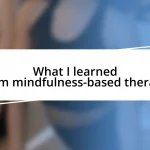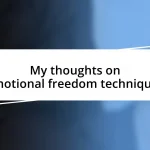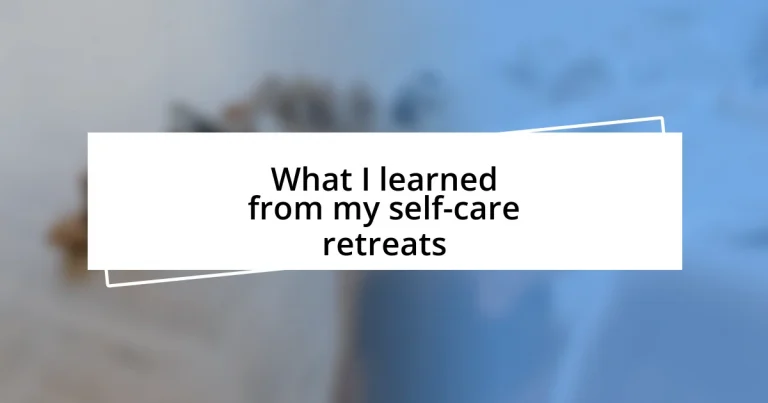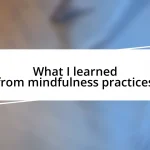Key takeaways:
- Self-care encompasses activities that promote mental, emotional, and physical well-being, emphasizing the need for introspection and personal connection.
- Self-care retreats provide essential opportunities for recharging, fostering community, and creating clarity through silence and shared experiences.
- Incorporating lessons from retreats, such as gratitude practices and mindful movement, can lead to long-term benefits in managing stress and deepening personal relationships.
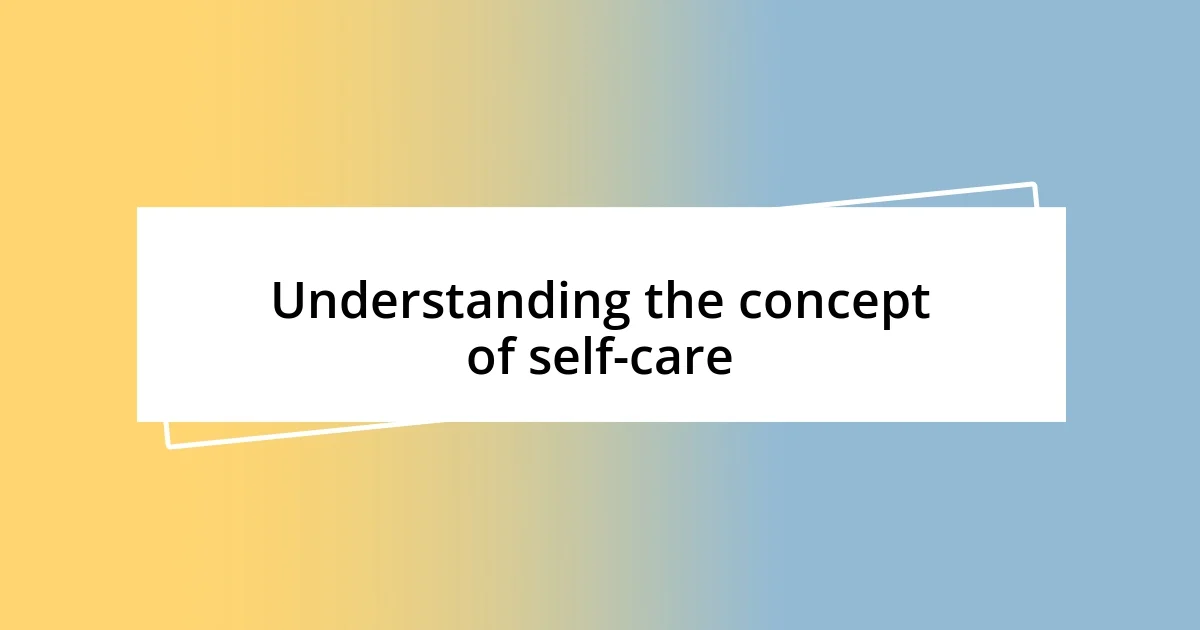
Understanding the concept of self-care
Self-care is more than just a buzzword; it’s a vital practice for mental, emotional, and physical well-being. I remember a time when I felt utterly drained from work and personal commitments. It became clear to me that neglecting self-care was not only affecting my mood but also my productivity—a lesson that has profoundly shaped my routine.
One of the beautiful insights I’ve gathered from my personal experiences is the importance of listening to my body and mind. Have you ever noticed how a simple walk in nature can shift your entire day? For me, those quiet moments have become sacred, offering not just relaxation but a chance to reconnect with myself. It’s truly amazing just how rejuvenating these small acts of kindness toward oneself can be.
Self-care can also take many forms, tailored to what resonates with each individual. I recall a weekend where I dedicated time to journaling about my thoughts and feelings. This act let me process emotions I didn’t even realize I was carrying, highlighting the necessity of setting aside time for introspection. How often do we rush through life without reflecting on our own needs? Recognizing the diverse expressions of self-care has empowered me to prioritize activities that resonate deeply with who I am.
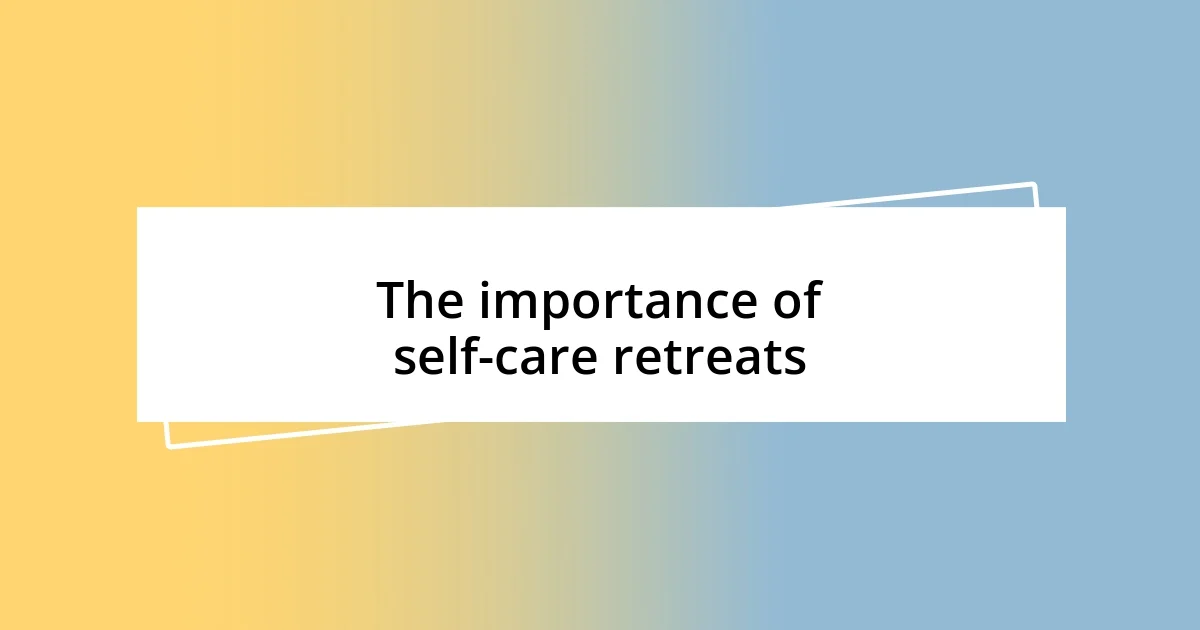
The importance of self-care retreats
Self-care retreats serve as a crucial sanctuary for individuals to recharge and realign with their inner selves. I experienced this vividly during my first retreat; stepping away from the chaos of everyday life was like removing a heavy backpack I didn’t realize I was carrying. The mere act of disconnecting from technology allowed me to immerse myself in nature and my thoughts, reviving my spirit and rekindling my creativity.
During these retreats, I’ve learned that taking intentional breaks can have profound effects on our mental health. One particular moment that stayed with me was when I sat in silence, surrounded by the gentle rustling of leaves. It struck me how often we fill our lives with noise, preventing ourselves from fostering true clarity. The retreat offered me a much-needed space to reset my perspective and appreciate the stillness.
Moreover, self-care retreats underscore the importance of community and shared experiences. I vividly recall bonding with fellow participants over shared stories of personal struggles. This sense of connection lifted my spirits, reminding me that I am not alone in my journey. It highlighted the power of vulnerability; embracing our challenges can foster deep connections that support our healing paths.
| Benefits of Self-Care Retreats | Personal Insights |
|---|---|
| Rejuvenation | Stepping away from daily chaos rekindles creativity. |
| Clarity | Silence fosters true mental clarity and resets perspective. |
| Community | Shared experiences create supportive connections. |
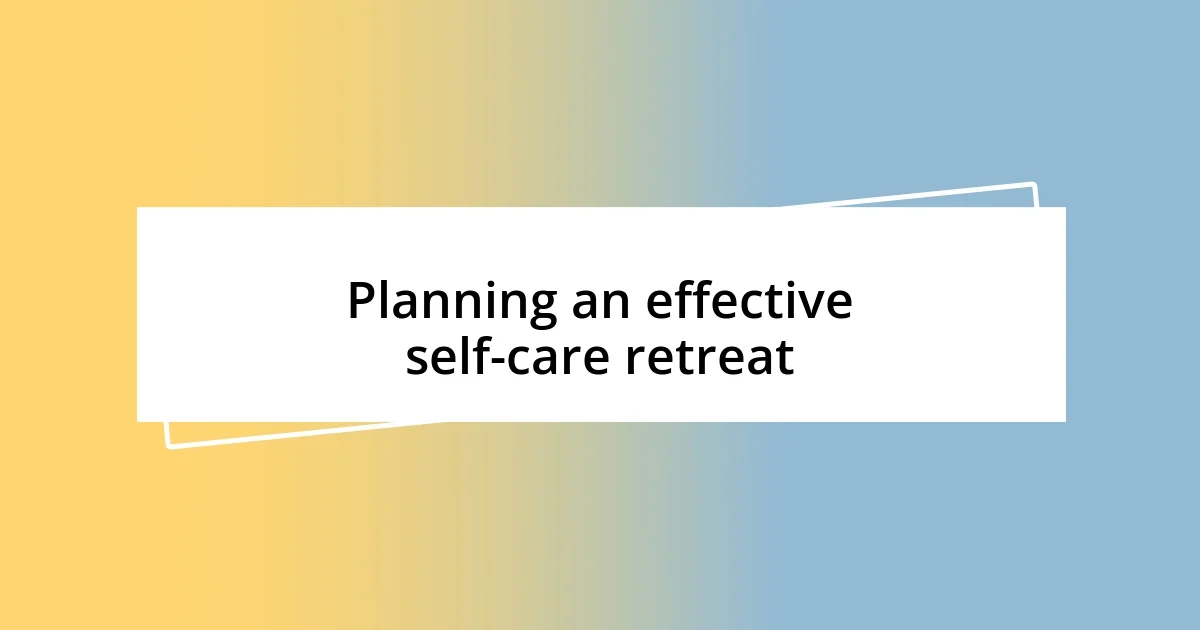
Planning an effective self-care retreat
When planning an effective self-care retreat, it’s essential to keep your personal needs and preferences at the forefront. I remember meticulously crafting an itinerary that balanced structured activities with free time for introspection. This blend allowed me to enjoy workshops while also having quiet moments to simply breathe. The key is to create an environment where you feel safe to explore, reflect, and rejuvenate.
Here are some practical tips to ensure your retreat is impactful:
- Define Your Goals: What do you hope to gain from the retreat? Write down specific outcomes you want to achieve.
- Choose the Right Location: Select a space that inspires you. For me, being near the water brought a sense of calm that was priceless.
- Design a Balanced Schedule: Mix engaging activities with ample downtime to avoid feeling overwhelmed. A single hike followed by hours of reflection in a cozy corner might be just right.
- Limit Distractions: Consider leaving technology behind. I found that going offline opened me to experiences I would have otherwise missed.
- Incorporate Nourishing Food: Plan meals that make you feel good. A delicious, healthy meal can be such a powerful act of self-kindness.
- Create Rituals: Introduce small rituals, like morning yoga or evening journaling, to ground your experience in mindfulness.
In my experience, these elements combined can turn a simple getaway into a transformative retreat.
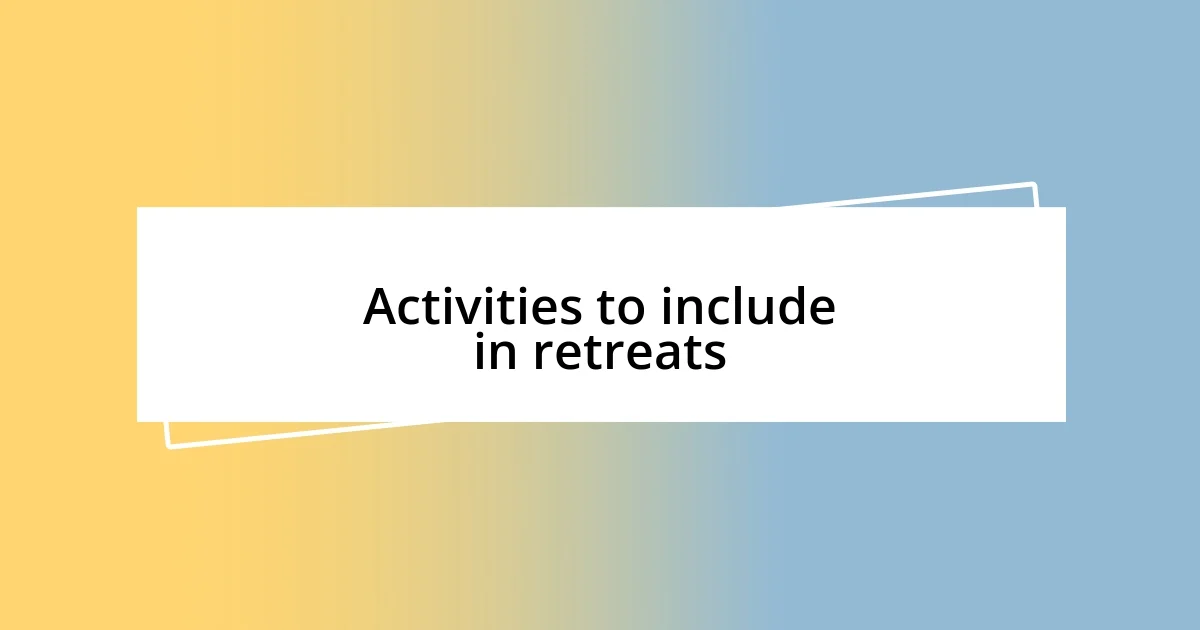
Activities to include in retreats
Incorporating movement-based activities can elevate the experience of a self-care retreat. One of my favorite activities is yoga, and I can’t stress enough how beneficial it has been for my own journey. During a sunrise yoga session I participated in, I felt the energy of the new day blend with the gentle stretches of my body. It was a reminder of how powerful it is to connect physical movement with mindfulness. Have you ever felt that electric shift in your mood right after a yoga class? That’s the kind of magic I recommend weaving into your retreat experience.
Another enriching activity I highly recommend is guided meditation, which helped me cultivate a deeper connection to my thoughts. The first time I participated in a guided session, I found myself exploring parts of my mind that had been neglected. The soothing voice of the instructor led me gently into a space where I could confront my anxieties, and I emerged feeling lighter and more liberated. Have you ever tried to sit in silence and let your thoughts flow freely? It can be quite transformative!
Finally, don’t overlook the power of creative expression during your retreat. Whether it be art, journaling, or even music, engaging in creative activities can help you process your emotions. I remember an art session where I let my paintbrush dance freely; each stroke felt like a release. It was a beautiful way to express feelings I didn’t even know I was holding onto. Have you ever painted your emotions or written them down? It can lead to such profound insights about oneself. Trust me; unleashing your creativity can foster healing in ways you might never expect.
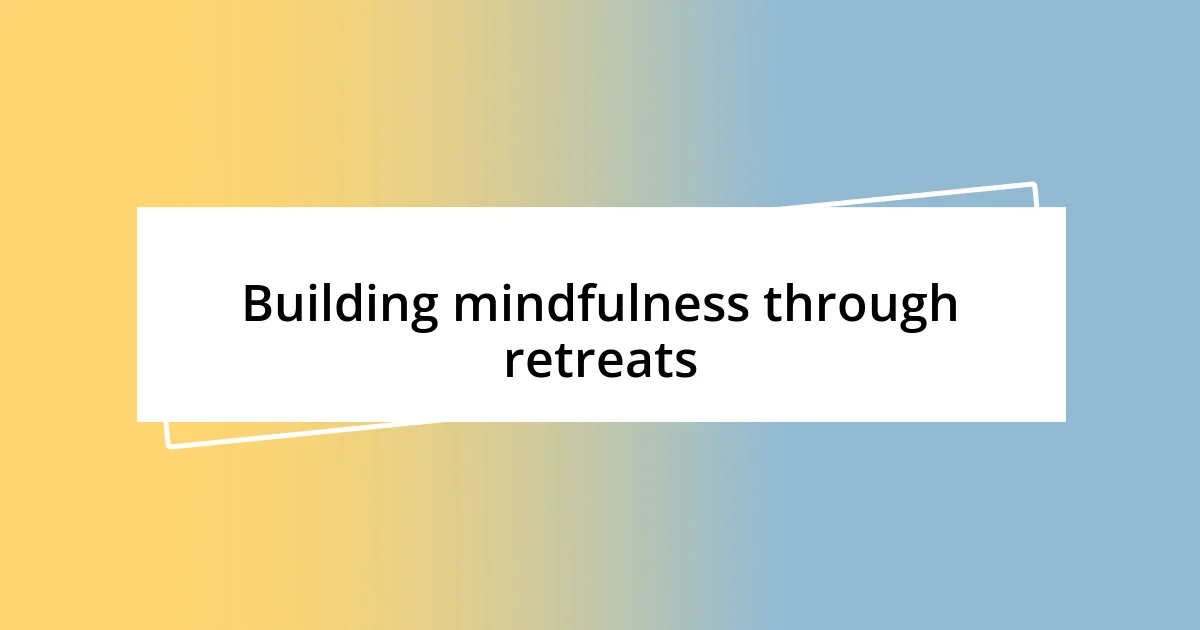
Building mindfulness through retreats
Building mindfulness during retreats truly requires intentional practices. I vividly recall a time when I sat in a serene garden, just observing nature. As I watched the leaves dance in the breeze, I felt my thoughts settle. Isn’t it incredible how just pausing and tuning into our surroundings can ground us? This connection to nature helped me cultivate a sense of presence, and it’s something I now prioritize daily.
One of my most profound experiences was engaging in a silent meditation retreat. The absence of chatter and distractions forced me to sit with my thoughts, allowing buried emotions to surface. I remember feeling a wave of discomfort initially, but as I embraced those feelings, I found clarity. Have you ever faced your inner voice, stripped of external noise? That confrontation can be both daunting and liberating, leading to a deeper connection with oneself.
Incorporating mindful breathing exercises into my retreat routine was a game changer. I still cherish the moment I participated in a breathing workshop that opened my eyes to the power of the breath. It felt like unlocking a hidden door to my mind—each inhale filled me with energy while each exhale released tension. Just think about it: how often do we breathe mindlessly? Deliberate breathing became my anchor, a tool that I still employ in day-to-day life when I need a moment of calm.
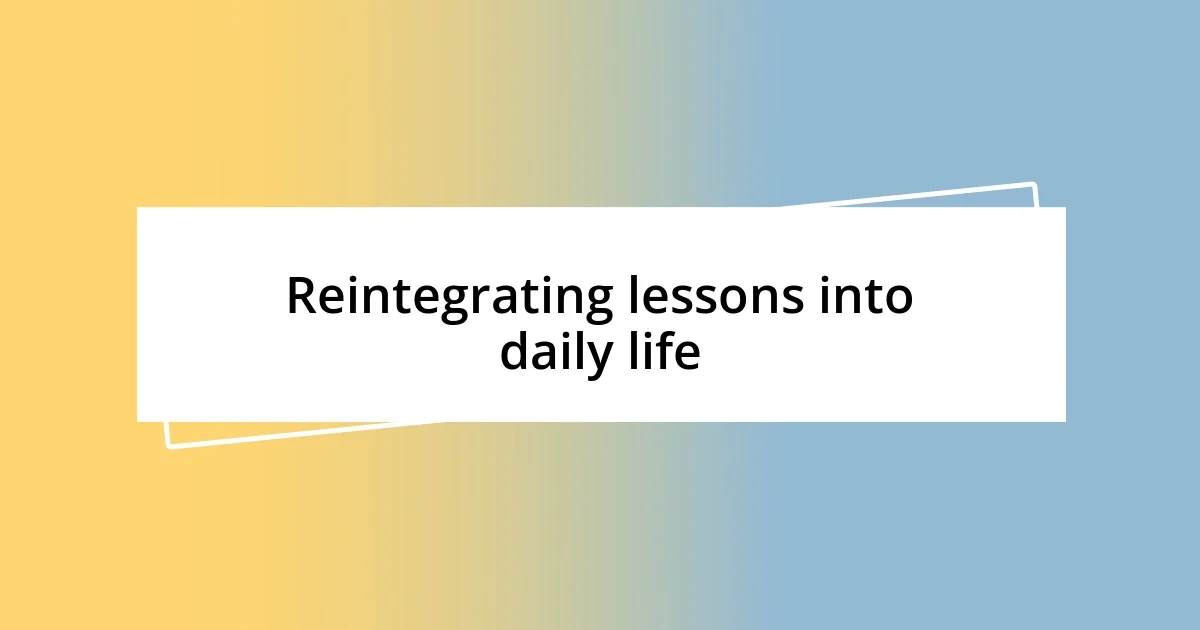
Reintegrating lessons into daily life
Reintegrating lessons from my self-care retreats into daily life has been a transformative process. One tradition I adopted is a nightly ritual of reflecting on the day’s experiences, which keeps me grounded. I often think back to a retreat where journaling became my lifeline; that practice revealed so much about my daily patterns. Have you ever noticed how writing can shed light on your inner landscape? I find it essential to check in with myself like this every night.
Mindful movement, another lesson, has woven seamlessly into my routine. After experiencing the rush of emotion during a dance session at a retreat, I realized how invigorating it is to express myself physically. Now, I take short dance breaks when I feel the need to shake off stress or refresh my mindset. Don’t you love that feeling of liberation? Turning up the music and moving freely gives me an instant dose of joy.
One of the most significant adaptations I’ve made is incorporating gratitude into my mornings. During a retreat, I learned how powerful it is to acknowledge the little things that bring me joy. I remember standing on a balcony, savoring the sunrise with a warm cup of tea, and jotting down what I was grateful for. It’s fascinating how such simple acts can direct your focus away from stress and foster a sense of fulfillment, isn’t it? So now, every morning, I list three things I appreciate, setting a positive tone for the day ahead.
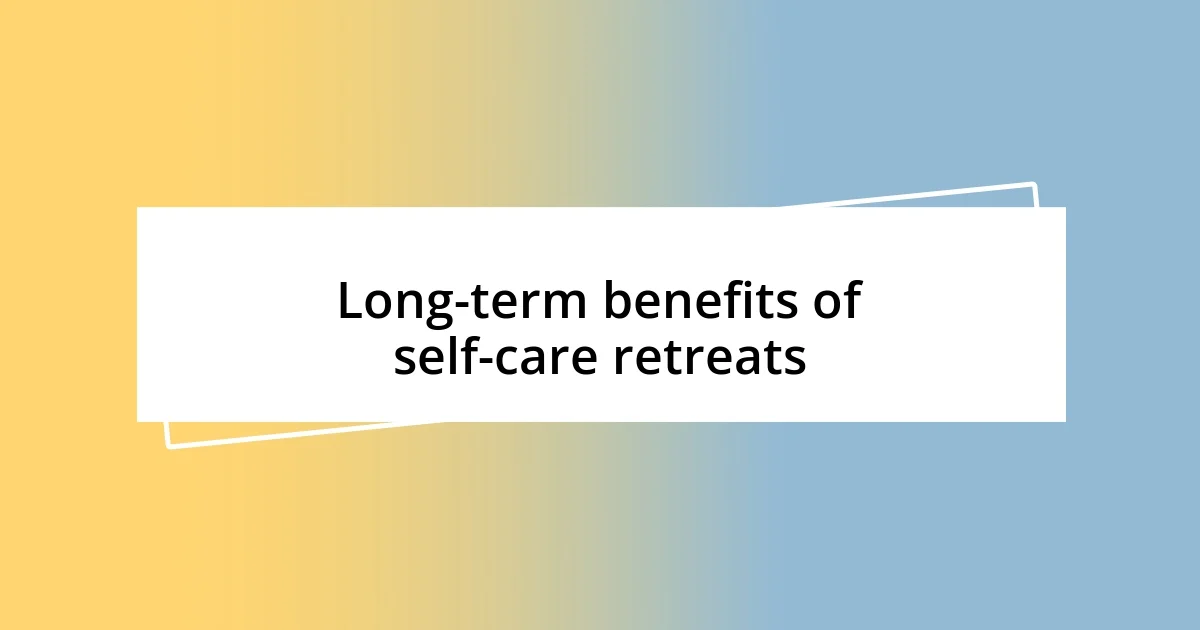
Long-term benefits of self-care retreats
Investing time in self-care retreats has profound long-term benefits that I continue to reap in my daily life. One striking change was how I learned to approach stress. After a particularly rejuvenating retreat focused on holistic wellness, I embraced the idea that stress is a natural part of life—but managing it effectively is key. I vividly recall a moment during a guided session where I experienced the release of tension in my body, feeling lighter with each subsequent breath. How empowering it is to transform stress from a burden into a manageable companion in my journey!
Another lasting effect has been the way I cultivate deeper connections with others. At one retreat, I engaged in heart-opening workshops that encouraged vulnerability and authenticity in relationships. It left me with a burning realization: true connection requires openness. Since then, I’ve made an effort to truly listen to friends, often checking in with them about their feelings. How rewarding it is to create spaces where others feel safe to share! Through these deeper conversations, I’ve developed lasting bonds that energize my spirit.
Likewise, the absolute commitment to self-compassion I adopted during my retreats has transformed how I respond to setbacks. At a transformative weekend retreat, I remember coming face-to-face with my own critic, a voice that often overshadowed my achievements. I started to practice self-kindness, reminding myself that it’s okay to stumble and learn. This realization has opened my heart; now, when I face challenges, I ask myself, “Am I being as kind to myself as I would to a dear friend?” This simple shift has empowered me to bounce back more resilient than ever.





